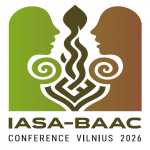Auditory memory & sound archives from the late-19th century to the present
Auditory memory and sound archives from the late-ninteenth century to the present
Funded by: Onderzoekszwaartepunt Cultural Heritage and Identity, Volkswagen Foundation
- Carolyn Birdsall
- Manon Parry
- Viktoria Tkaczyk
The current project seeks to investigate the term “auditory memory”, which has been largely neglected in memory studies in favour of visually‐oriented arts of memorization, with their long tradition within rhetoric (ars memorativa).
Auditory memory
The current project seeks to investigate the term “auditory memory”, which has been largely neglected in memory studies in favour of visually‐oriented arts of memorization, with their long tradition within rhetoric (ars memorativa). A central concern is to what extent different forms of sound memorization have become relevant in science, art and media technology from the late‐nineteenth century to the present. The project will especially focus on how sound has been stored and archived with the aid of different media technologies, material cultures and bodily techniques, and how each of these forms of auditory memories has generated a specific form of “cultural heritage of sound”.
Three main, intersecting strands
For the purposes of the workshop, there will be three main, intersecting strands discussed. The first strand concerns how human auditory memory has been defined in psycho‐physiological research from the late nineteenth century, and subsequently in the cognitive sciences. How do medical notions of “auditory memory” correspond with or differ from concepts of auditory memorization related to rhetoric or media
technology? The second strand concerns the establishment of sound archives as formal institutions. Who has been involved in founding sound archives since the late‐nineteenth century? And what rationale was
provided for their formation? How did different disciplines such as phonetics, physiology (of speech and hearing), (comparative) musicology or theatre studies approach and make (scientific) use of these archives? A third, related strand concerns the preservation and presentation of sound archival material in the present.
How did the status of sound archives change through the invention of radio and new means of sound recording and digitisation during the course of the twentieth century to the present? How might sound archives transform exhibition strategies of museums and art galleries to fully exploit their collections for public use?
PROGRAM
9.15‐9.45 Welcome / Introduction
9.45‐11.00 Session 1: Psycho‐physiological and Neuroscientific Concepts of Auditory Memory
- Viktoria Tkacyzk (Amsterdam/Berlin): “Auditory Memory Research and Sound Archives around 1900”
- Ashley Burgoyne (Amsterdam): “Finding the 'hook': Thoughts on long‐term musical salience”
- Julian Kiverstein (Amsterdam): “How to Think about Sound with Neurons?”
11:00‐11:15 Coffee
11.15‐12.15 Session 2: The Making of Science in Sound Archives
- Britta Lange (Berlin): “History of Science and Personal Stories: Auditive Memory in German Sound Archives“
- Julia Kursell (Weimar): “Carl Stumpf and the Berlin Phonogramm Archive”
12:15‐13:45 Lunch
13:45‐15:15 Session 3: Sound Archives, Media Forms
- Carolyn Birdsall (Amsterdam): “Post‐Colonial Echoes: Radio Archives in Interwar Germany”
- Mara Mills (New York): “Talking Book Archives in the U.S. and the Question of "Prescription Media"
- Ricarda Franzen (Amsterdam): “Archiving Theatre Sound in Amsterdam, 1930‐1980”
- Nora Probst (Cologne): “Performing Sound Archives: Martin G. Sarnecks and his ‚Kulturhistorisches Archiv”
15:15‐15:30 Coffee
15.30‐17.15: Session 4: Presenting the Cultural Heritage of Sound
- Karin Bijsterveld (Maastricht): “The Amsterdam Soundscape Installation: Auditory History in the Museum Context“
- Manon Parry (Amsterdam): “Public History, Sound Archives, and the Transformation of Exhibition Strategies”
- Stephen Amico (Amsterdam): “Ethnomusicology and the (Digital) Archive”
- Arnoud van Traa (Amsterdam): “Crowdsourcing and Sound Archives”
17.15‐17.45 Closing discussion
Followed by borrel/drinks


